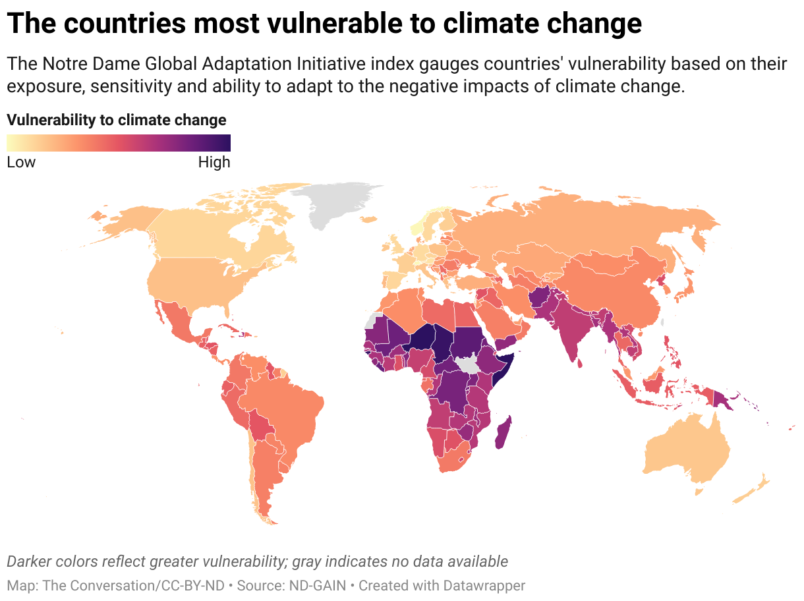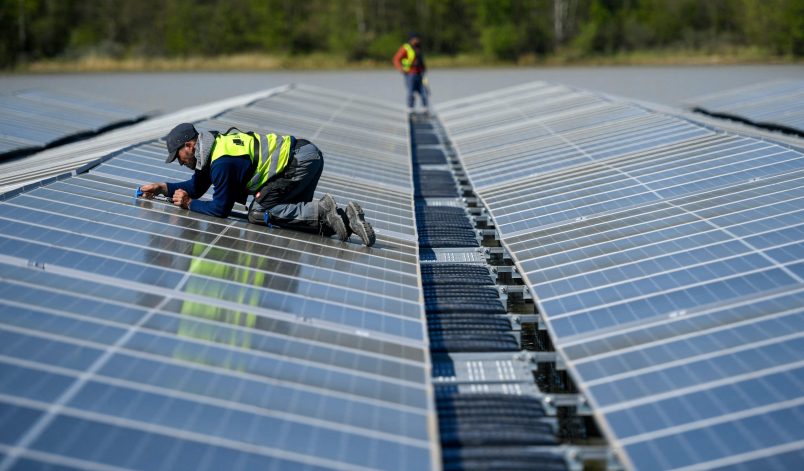This article is part of TPM Cafe, TPM’s home for opinion and news analysis. It was originally published at The Conversation.
The year 2022 was a tough one for the growing number of people living in food insecurity and energy poverty around the world, and the beginning of 2023 is looking bleak.
Russia’s war on Ukraine, one of the world’s largest grain and fertilizer feedstock suppliers, tightened global food and energy supplies, which in turn helped spur inflation.
Drought, exacerbated in some places by warring groups blocking food aid, pushed parts of the Horn of Africa toward famine. Extreme weather disasters have left trails of destruction with mounting costs on nearly every continent. More countries found themselves in debt distress.
But below the surface of almost weekly bad news, significant changes are underway that have the potential to create a more sustainable world — one in which humanity can tackle climate change, species extinction and food and energy insecurity.
I’ve been involved in international sustainable development for most of my career and now teach climate diplomacy. Here’s how two key systems that drive the world’s economy — energy and finance — are starting to shift toward sustainability and what to watch for in 2023.
Ramping up renewable energy growth
Russian President Vladimir Putin’s war on Ukraine has reverberated through Europe and spread to other countries that have long been dependent on the region for natural gas. But while oil-producing countries and gas lobbyists are arguing for more drilling, global energy investments reflect a quickening transition to cleaner energy.
Call it the Putin effect — Russia’s war is speeding up the global shift away from fossil fuels.
In December, the International Energy Agency published two important reports that point to the future of renewable energy.
First, the IEA revised its projection of renewable energy growth upward by 30%. It now expects the world to install as much solar and wind power in the next five years as it installed in the past 50 years.

The second report showed that energy use is becoming more efficient globally, with efficiency increasing by about 2% per year. As energy analyst Kingsmill Bond at the energy research group RMI noted, the two reports together suggest that fossil fuel demand may have peaked. While some low-income countries have been eager for deals to tap their fossil fuel resources, the IEA warns that new fossil fuel production risks becoming stranded, or uneconomic, in the next 20 years.
The main obstacles to the exponential growth in renewable energy, IEA points out, are antiquated energy policy frameworks, regulations and subsidies written at a time when energy systems, pricing and utilities were all geared toward fossil fuels.
Look in 2023 for reforms, including countries wrestling with how to permit smart grids and new transmission lines and finding ways to reward consumers for efficiency and clean energy generation.
The year 2023 will also see more focus on developing talent for the clean energy infrastructure build-out. In the U.S., the recently passed Inflation Reduction Act and the Bipartisan Infrastructure Law will pour hundreds of billions of dollars into clean energy and technology. Europe’s REPowerEU commitments will also boost investment. However, concerns about “buy American” rules within the new U.S. climate laws and an EU plan to launch a carbon border adjustment tax are raising fears that nationalism in trade policy could harm the speed of green growth.
Fixing international climate finance
The second system to watch for reform in 2023 is international finance. It’s also crucial to how low-income countries develop their energy systems, build resilience and recover from climate disasters.
Wealthy nations haven’t moved the energy transition forward quickly enough or provided enough support for emerging markets and developing countries to leapfrog inefficient fossil-fueled energy systems. Debt is ballooning in low-income countries, and climate change and disasters like the devastating flooding in Pakistan wipe out growth and add costs.
Barbados Prime Minister Mia Mottley has brought together international financial institutions with think tanks and philanthropists to push for changes.
Countries like Mottley’s have been frustrated that the current international financial system — primarily the International Monetary Fund and the multilateral development banks, including the World Bank — haven’t adapted to the growing climate challenges.
Mottley’s Bridgetown Initiative proposes a new approach. It calls for countries’ vulnerability to be measured by climate impact, and for funds to be made available on that basis, rather than income. It also urges more risk-taking by the development banks to leverage private investment in vulnerable countries, including climate debt swaps.
The Bridgetown Initiative also calls for countries to reflow their IMF Special Drawing Rights — a reserve available to IMF members — into a proposed fund that vulnerable countries could then use to build resilience to climate change. A working group established by the G-20 points out that the “easiest” trillion dollars to access for urgent climate response is that already in the system.
In early 2023, Mottley and French President Emmanuel Macron, with others, will drive a process to examine the possible measures to improve the current system before the annual meetings of the World Bank and the IMF in April, and then at a June summit called by France.

Watch in 2023 to see if this is the year the G-7 and the G-20 rekindle their global economic leadership roles. Their members are the largest owners of the international financial institutions, and also the largest emitters of carbon dioxide on the planet. India will lead the G-20 in 2023, followed by Brazil in 2024. Their leadership will be critical.
Watch small nations’ leadership in 2023
In 2023, expect to see small nations increasingly push for global transformation, led by the V-20 — the finance ministers of the countries most vulnerable to climate change.
In addition to the Bridgetown Initiative, Barbados has suggested a way to pool new funds working off the model of an oil spill damage fund at the International Maritime Organization. In the IMO fund, big oil importers pay in, and the fund pays out in the event of a spill. Barbados supports creating a similar fund to help countries when a climate event costs more than 5% of a country’s GDP.
This model is potentially a way to pool funds from a levy on the windfall profits of energy companies that saw their profits soar in 2022 while billions of people around the world suffered from energy price inflation.
Finally, the breakthrough agreement on biodiversity reached in December 2022 provides more promise for 2023. Countries agreed to conserve 30% of the world’s biodiversity and restore 30% of the world’s degraded lands. The funding — a $30 billion fund by 2030 — remains to be found, but the plan clarifies the task ahead and nature’s place in it. And we can hope 2023 is a year when signs of peace in our war against nature break out.
This article is republished from The Conversation under a Creative Commons license. Read the original article.







Happy New Year! Sustainable energy is a response to multiple crises. Humans sometimes need their backs against the wall to make changes.
Needed
A lot
The speed with which renewable energy is being adopted is amazing. I knew the world was changing when my son told me he was installing solar panels on his roof, and his company, GM, was moving strongly to electric vehicles.
Please TPM…
Please
DO NO GIVE ANY CREDIT TO PUTIN FOR HIS WAR IN UKRAINE FOR ANYTHING OTHER THAN MURDER, RAPE, BRUTAL TERRORISM AND UTTERLY INHUMAN WAR MOST FOUL.
That it might lead to energy without a national grid is out of a need to survive his evil war and should never lead to any sort of credit to him. This is akin to thanking Hitler for creative ways to ship people to his death camps so they could be killed on an industrial scale.
I am not against clean energy. Far from that thought. Solar panels we have on this house already and it lowers our energy bill. That is a good thing. Mrs darr had a Prius when they first came out but after a few years the huge lithium battery failed. She now has a new Honda CRV that shows mileage in excess of 40 miles to the gallon… we bike when practical. … All of which is no credit to that fucking monster in Moscow
Putin does not give a shit about clean energy. Oil and gas being a tool of war on Europe. His “contributions” to human kind are blood an misery, not positive needed things. The attacks on Ukraine are beastial murder of innocents and not meant as a positive path to lowering climate change. He is Hitler reincarnated.